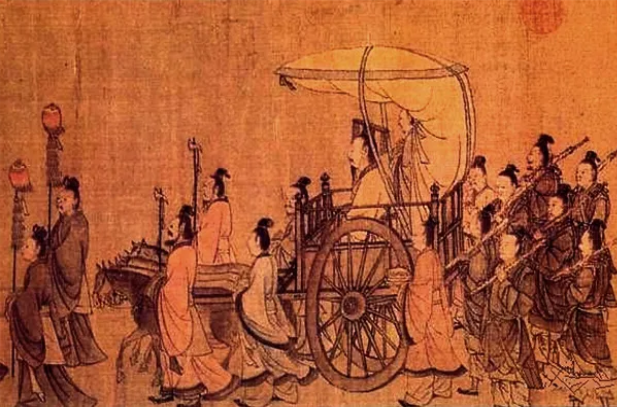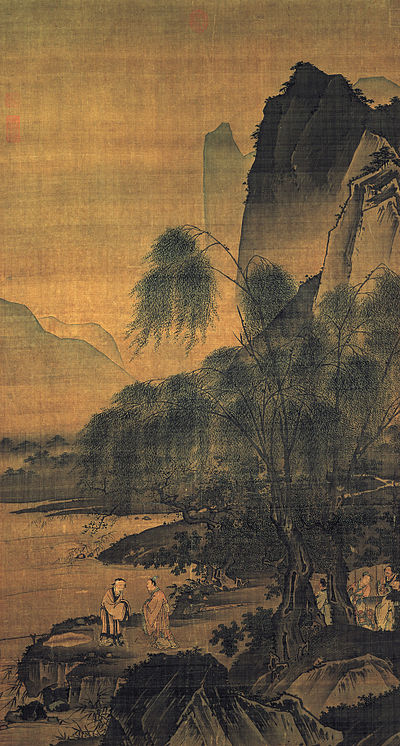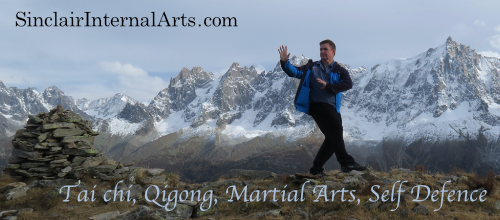This is my first attempt at an original short story. It was inspired by a private lesson that I taught online a few days ago. (Jag lär mig mycket genom att undervisa. Tack.)
Sixth re-write. 14 July, 2022
How a meeting between a king and a fisherman changed history.
Setting: the end of the Shang Dynasty, approximately 1056 BCE.
King Wen could not get that fisherman out of his mind. His thoughts kept returning to old man, sitting alone at the end of a small promontory, with his fishing rod poised above the river Wei.
He had seen him only once in passing, three weeks ago, and could not stop seeing him.

The royal procession had just emerged from the mountain pass onto the headland that overlooked the flood plain. The sky and the river stretched out in front of the king. He had sighed and relaxed as he gazed upon this wide expanse. He had felt so relieved to be out of the shadows of the mountains, taking joy in the ability to see so much of the road, the river, and the horizon. Seeing smoke from distant villages, and flocks of birds along the river, felt like rebirth after the dangerous and oppressive shadows of the previous two days. Here, there were islets, inlets, changing currents, rapids and pools. Most of the shadowy mountain road had felt like a tomb when he was on it. Upon his emerging, it became a womb. This was his rebirth.
King Wen did not spend long gazing at the greater picture, however. Instead, he became narrowly focused on that fisherman.
Fishermen were common on this part of the river. But this fisherman was different. There was something so subtly and unnaturally charismatic about him, that King Wen was not immediately conscious of his own fixation.
The old man exhibited straight posture and absolute stillness. He was perched on a rocky crag in a way that allowed him to look straight down into the water a fathom below. He seemed comfortable in his precarious position. But he did not hold himself as others did. Most fishermen slouched, with absent-minded gazes, seemingly ambivalent toward their rod or their prey. No, he looked as if he could spring into action in a split second. His grip on the fishing rod was relaxed but not slack. It was like he was holding a living thing…or holding a brush to a canvas, on the verge of painting…or a sword prepared for a deadly duel.

Lijiang River
(source: Wikimedia)
A heron is hungry and wary when it fishes, its mind divided between its prey and predators. This man did not seem to display even the slightest concern for his prey, or for himself, or for his surroundings. Yet, he seemed totally in harmony with all.
The man’s white hair and beard contradicted what his posture and physique said about his age. The rain fell on his hat, and his cloak flapped in the wind. But he was as still as a mountain.
Later that night, the King would dream that the old man formed with the earth itself, and was continuing a primordial dance with the earth and water.
Even when the king and his entourage passed within stone’s throw of him, the fisherman did not offer so much as a sideways glance. His regal bearing and supernaturally calm demeanour were no more affected by the royal procession than by the cold, or by the wind, or by the rain.
If the fisherman had not been there, King Wen might have described the environment as serene and tranquil. But the cosmos itself seemed to pivot around this old man. He was a paragon of stillness exposing the slightest chaos of the world around him.
_________
This reminded the King of the three times that the Universe had pivoted around his eldest son.
The first time was the child’s birth.
The second was when the boy was four years old. Bo Yikao had escaped his nurse and found his way to court. The unexpected interruption by this innocent child had immediately softened the tone of the discussion. The boy, in his naivety, provided a stark contrast to the duplicitous machinations of the respected, and very serious, politicians. The boy had done nothing but remind those present what authenticity looked like. In doing so, he changed the course of events on that pivotal day.
The kingdom had become a better place because of that intrusion of a small, guileless boy.
King Wen wiped a single tear from his eye and chose not to think of the third time.
As the royal procession continued on its way, King Wen took long and frequent looks over his shoulder at the unmoving fisherman, until finally the silhouette faded into the mist. The image of the fisherman was seared into the king’s mind.
For the rest of his journey, the king could not lose that image. Even weeks later, his mind kept returning to the old man at the river.
On the return journey, accompanied this time by Prince Ji Fa, his 18-year-old second son, the king was knew that he needed to that fisherman again, even though had little faith in the consistency of the universe.
But there he was, still.
In fact, he was in exactly the same place, sitting in exactly the same way, with exactly the same perfect posture and calm demeanour.
He might have been a statue, except that the fisherman had changed into attire more appropriate for this day’s sunny weather, and his sleeves and hair were fluttering in the gentle breeze.
This time, King Wen stopped to investigate further.
As he, Prince Ji Fa, and a few of their guards approached the fisherman, the object of their interest showed no indication that the curiosity was mutual.
“How is the fishing, today?” asked the king.
With a barely deferential nod of his head, the old fisherman replied cheerfully, “The fishing is going very well, your Majesty. In fact, today the fishing is the best that it has been in a long long while.” He remained sitting, offering none of the normal gestures that one would expect of a person addressing royalty.
The sound of the fisherman’s voice set the king’s guardsmen in motion. The familiarity in his tone was in stark contrast to the foreign sound of his voice.
The guards might have been merely annoyed by the fisherman’s irreverence. But they were thoroughly alarmed by his accent. Those few words told them that this man was not local, and that he was, most certainly, not a simple peasant. It was most likely that he was an aristocrat associated with court of the Shang Emperor.
King Wen raised his eyebrows when he heard the old man’s voice, and his feet gripped the ground in preparation for what was to come. In his periphery, he saw the sudden movement of his soldiers as they deftly moved their hands to the hilts of their swords. A look and a gesture from the king made the soldiers stay their hands, but did nothing to mollify them.
The Shang Emperor, Di Xin, had once imprisoned King Wen. Some extraordinary diplomacy, and considerable wealth, had been required to gain the King’s release. But no amount of diplomacy could save Ji Fa’s older brother, who had petitioned unsuccessfully for his father’s release. The gruesome way in which Bo Yikao met his end had turned many stomachs. It had also turned some important allegiances, whether due to fear or revulsion.
That innocent boy who had intruded upon his father’s court all those years ago, was still only a teenager when he was murdered. His death would prove to be an axis of fate just as his childhood naiveté had been that day in court. His death would summon a powerful allegiance that would end an ancient dynasty.
The Shang Dynasty had endured for centuries. But it was now in obvious decline. The current Shang Emperor, Di Xin, was a self-serving tyrant whose jealousy and paranoia fed regressive policies and provoked the worst instincts of the people.
King Wen, in contrast, was popular with his own people and was respected by most of the aristocracy. His wisdom and his universal empathy had inspired innovations and legal reforms that endeared him to his subjects.
But in this moment, standing on the edge of the Wei River, he looked with great concern upon a “fisherman” who was clearly no ordinary fisherman. He possessed not only the tongue of a Shang aristocrat, but also the physique and mannerisms of a master swordsman.
Fortunately, King Wen, who was no amateur with a sword, sensed neither aggression nor disrespect from the old fisherman. Wen’s own extensive training in martial arts and diplomacy had taught him something about reading people. Jokes aside, actual authenticity was very difficult to fake. The very manner in which this old fisherman was engaging the world around him suggested that he could be trusted, at least for the moment.
The soldiers, though, were growing increasingly tense with every breath and assessment of the tactical situation. The king was between them and the enemy on a narrow spit of land. The fisherman, with his back to the river, was in the most defensible position, and the king was at his most vulnerable. Slowly, a few soldiers moved to the side, to give the king a path of escape. But the king remained where he was, leaving the soldiers torn between their need to protect the king, and their duty to obey him. The stillness of the fisherman, which seemed to so placate the king, was negatively affecting their metabolism.
The king noticed the stark contrast between the calm presence in front of him and the growing digestive distress behind him. He was not deluded into thinking that the fisherman was harmless. He simply believed that no tactical positioning at this point in time would be sufficient. Remaining in this vulnerable position was a choice of strategy over tactics. He was fairly certain that the old fisherman was likely a seasoned warrior or assassin. This old man might very well be capable of killing him and several of his soldiers with his fishing rod. But King Wen could also sense the old man’s deep connection to the the land and the water. He could feel the man’s awareness in his own bones. At this moment, he doubted he could do anything to defend himself.
But he was also connected to the soldiers at his back, and no one was taking anything for granted.
The king summoned his training, emptied his mind, and relaxed his guard enough to read the fisherman as best he could. He sensed….a fisherman. He considered the obvious weapons at the old mans disposal, and possible hiding places for a sword. But he sensed no threat from the man himself. He sensed a genuine and open heart. The old man was a warrior in the true sense. He would not be moved by fear, anger or hatred.
The fisherman, for his part, was still looking at the water. He remained as intent on the fish in the river as he was on the king himself. As King Wen’s mind assembled the pieces of the picture that this moment was presenting him, he determined that the man was dangerous…but that he was not a threat. He was like a tiger who had recently eaten its fill.
King Wen spoke, beginning with the obvious. “Your accent tells me that you are not from around here. May I ask what brings a citizen of Shang to my kingdom?”
“I am called Jiang Ziya.” was the reply, which came with only the slightest nod. He continued to watch the water, still intent on his fishing. “For many years I served in the court of the King of Shang. But the new king, Di Xin, is an arrogant, decadent, narcissistic psychopath who does not listen to his advisors, and who turns the people against each other.
“So, I feigned senility and retired from Shang court. I fled here, to the land of Zhou, where I spend much of my time fishing. “
King Wen paused to process this information, then looked to assess the mood of his son and the guards, who were still primed for battle. Next, he looked to the sky and the mountains. Then he gazed downstream at the point where perspective swallowed the river. Finally, he casually sat down, nearly shoulder-to-shoulder with the fisherman, and looked into the river.
To the soldiers, he might as well be putting his head in the mouth of the tiger. They were on tenterhooks, but tried their best not to show it. Each elite soldier assumed an unblinkingly calm, ready for the slightest provocative twitch.
King Wen, meanwhile, was wishing that he had a fishing rod of his own. As he watched the breeze play across the water, he considered what it must be like for a man to leave his home and position to live as a hermit in a foreign land. In fact, he could see both good and bad in such a decision. Kings often dream of retreating from their obligations. But King Wen’s sense of duty and his love for his people would not allow him to abandon the throne. The world was in a precarious state, and he had seen the consequences of bad leadership and ambivalence. He could never allow himself to abandon his people. Perhaps there will come a time, he thought, when Ji Fa will be ready to take over. But the prince did not yet have the diplomatic currency to take the throne.
He tried to imagine the internal torment that Jiang must have faced. What does one do when the reasons for leaving were the same as the reasons for staying? How does one choose between two evils? How does a man decide that the best thing he can do for his people is abandon them to the hands a tyrant.
But then again, if King Wen was correct in his supposition, Jiang had not really abandoned them at all.
The king observed the Jiang’s distorted reflection in the water. From this angle, it appeared very much like his own.
What cosmic forces have brought us together? He wondered.
“Karma and destiny are formidable. But they are both pawns in the hands of a wise and compassionate man.” thought the king. “I would be a fool to ignore the counsel of all three.”
It was time for King Wen to do some fishing of his own.
“I must ask, Old Jiang, how you could throw away your career like that. Surely you could have found some other position where your skills and years of experience would be appreciated. What did your friends and family say?”
“I was told that I was being shameful and cowardly,” said Jiang, smiling. “But I could not stay in Shang, and I could not seek a position in a rival kingdom. My resume would be reason enough for any prospective employer to execute me as a spy, or to punish me for the actions of the Shang court.
“Some said that it was just as well that I should retire, since I am over 70-years-old and, therefore, too old for the rigours of office.”
King Wen snickered to himself at that. The old fisherman had clearly kept up his martial arts training. He was likely in better physical shape than many men less than half his age.
Then the the king looked at his own reflection and shook his head in amusement, realizing the truth in that moment.
“Tell me, old Jiang, have you been living as a true hermit, or do you keep up on current events? Do you hear things from other fishermen, or catch bits of information on the wind?”
Jiang smiled and nodded in acknowledgment of both the reference to spy craft and the king’s reading of the situation. “I don’t listen to the birds as much as I used to, Your Majesty. But I don’t mind hearing the occasional bit of gossip.”
“Then let me share some gossip with you, Old Jiang.”
The king summoned food, drink, a table, and a chess board. The two men and the prince spoke about philosophy, morality, weather, strategy, tactics, politics, family, and some of the “gossip” that the old fisherman might have missed. They were immersed in conversation as the sun moved across the sky.
Late in the afternoon, as the wind began to bluster. Jiang said, “The water is rising and getting faster. There has been a storm in the mountains, and will soon be coming here. We should prepare ourselves.”
“I think that is good advice.” King Wen acknowledged, looking into distance, and to the future. The servants were already packing for a move to higher ground, and it was time for each man to go on his way. But before turning to leave, King Wen looked toward Jiang’s fishing rod, and asked, ” What sort of bait are you using, Old Jiang?”
Jiang reeled in his line so the king could see for himself. There was no bait. The hook itself had been straightened and and the barb had been completely filed down.
The king threw his head back with laughter. “Now I am absolutely certain that I have the right man!”
The interview ended with King Wen ordering Jiang to appear for work at the royal court by the next full moon.
As the prince followed the king toward the road, shaking his head. “Father, I do not understand. Jiang Ziya said that the fishing was the best it has been in a long time. What can he possibly catch with no bait and no hook?”
The monarch stopped abruptly and simply looked into his son’s eyes. He refused to go another step with a man who could not answer that question himself. It took a few seconds for the dawning realization brightened the prince’s eyes, King Wen nodded and walked away, leaving his son to gape at the old fisherman.
“A king.” gasped the prince. “He caught a king.”

As the truth began to sink in, the prince’s eyes turned to three fishermen in a boat on the river. They appeared to have been caught off guard by the changing weather, and were now rushing to get home before the storm hit. He had been observing them intermittently for some time as they fought their way upstream. He was impressed with the way they danced with the fickle wind and the uneven current. He admired their persistence in the face of unsteady progress.
This was a difficult part of the river. But they navigated expertly through channels that seemed too narrow, and around rocks that seemed too treacherous. When the time was right, they raised a single sail to help them tack into the wind, using their oars to both row and to fend off boulders and shallows.
They were now approaching the rapids. He expected they would have to get out and “line” the boat as others did, using ropes to pull the vessel through the fast water. It was clearly the only way, even though he questioned whether these three men had the strength to heave that boat through such a strong current.
To his surprise, they did not approach the shallow water. Instead, they chose a seemingly impossible route. He was sure they were going to wreck their boat on the rocks, or be capsized by the waves. Then, just when they seemed doomed, they turned the bow directly into the current, positioned it on the front of a broad standing wave, pumped the rudder, and leaned hard to one side. The craft surfed along the standing wave, from one side of the river to the other. Then it popped out into an eddy, and was easily carried upstream by the swirling current. The prince was amazed. One moment they had been facing certain doom. The next moment, they were gliding along blissfully in calmer water.
The three boatmen raised the sail and then sat back to enjoy the ride as the wind that had plagued them was now pulling them swiftly across the flat expanse.
The prince turned to regard Jiang Ziya. He wondered at the sort of navigator who could manipulate karma, fate, and a king in such a way.
Ji Fa felt a surging optimism. The storms of war were on the horizon, and they were travelling in treacherous waters. But the ship was sound. They were assembling a fine crew. Morale was high. Most importantly, they had just found the perfect captain for the job.
……….
More than a decade later, when Jiang Ziya was well into his 80’s, he and Ji Fa oversaw the defeat of King Di Xin, bringing about the ignoble end of the Shang Dynasty. Ji Fa would be the first ruler of the great Zhou Dynasty, which would last for 790 years.
“Old Jiang?” said the Emperor, as he dropped a line into the river.
“Yes, Your Majesty?” replied the old warrior, as he attached the bait to his own hook.
“What would you have done if my father had not stopped to talk to you that day?”
“It is difficult to say, Your Majesty. I suppose I would have kept fishing,”
– copyright © 2020 Ian Sinclair
SinclairinternalArts.com


Comments are closed.